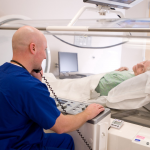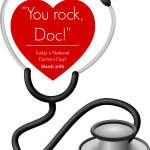Mamas, we love it when we get a chance to talk to a doctor who also happens to be a mother. We think that dual experience gives her a unique insight into health care and its real-life application in a family’s daily routine.  We think you’ll love this Q&A with Dr. Alisha Trent of Mercy.
We think you’ll love this Q&A with Dr. Alisha Trent of Mercy.
Moms are famous for looking for answers from “Dr. Google.” What types of online sources can be trusted when people are looking for reliable medical information? Are there certain sites that you feel comfortable recommending to your patients when they want to get more info on a medical issue?
 Kellymom.com is a great site for new moms with breastfeeding questions. There is a lot of evidence-based information on that page.
Kellymom.com is a great site for new moms with breastfeeding questions. There is a lot of evidence-based information on that page.
CDC.gov is a great go-to website for the latest updates on a wide range of health topics.
WebMD is a good broad tool, but it isn’t the best site for people trying to Google symptoms. You could use it to gather information once your doctor diagnoses you with something and you need a bit more information about the condition.
What kinds of questions do you get asked most often by patients?
Patients come in often to discuss weight loss, which I love because I’ve had my own personal weight loss journey. Medical school doesn’t do a great job teaching about nutrition per se, however, because of my own needs I have done a lot of research on nutrition. I combine that research with my medical knowledge and compassion with those struggling to help patients through their own weight loss journeys.
With new first time moms, I get lots of questions about breastfeeding. I recently had a baby myself, and although he is my 3rd son, he is the first that I’ve breastfed. Given that I’ve recently been new to breastfeeding myself, I can also relate to the struggles and offer advice accordingly.
What kinds of questions do you think more patients SHOULD be asking when they’re at a doctor’s appointment?
 I think some people should ask more questions regarding their medications, especially from any specialists they may see. When I see patients and discuss their medications, I always ask what certain medications are being used for. Surprisingly, some people just do not know. I do my best to try to explain to people medications and their significance. I feel like if they know these things, it will help them be more compliant about using the medications as prescribed.
I think some people should ask more questions regarding their medications, especially from any specialists they may see. When I see patients and discuss their medications, I always ask what certain medications are being used for. Surprisingly, some people just do not know. I do my best to try to explain to people medications and their significance. I feel like if they know these things, it will help them be more compliant about using the medications as prescribed.
During the winter months, what types of conditions are you treating most often during a typical day at work? What could patients be doing to help prevent or avoid those conditions?
 For babies (younger than age 1), I see cases of Respiratory Syncytial Virus (RSV), which can really end badly if not caught early. Parents with new babies should avoid large public places, and when they do go out, they need to make sure people wash their hands or sanitize before holding babies. Also, kindly ask those holding your baby NOT to kiss the baby’s hands. Babies often put their little hands in their mouths.
For babies (younger than age 1), I see cases of Respiratory Syncytial Virus (RSV), which can really end badly if not caught early. Parents with new babies should avoid large public places, and when they do go out, they need to make sure people wash their hands or sanitize before holding babies. Also, kindly ask those holding your baby NOT to kiss the baby’s hands. Babies often put their little hands in their mouths.
For kiddos, I see cases of the common cold and other upper respiratory viruses. Cough medicines don’t help kids as they do with adults. It’s difficult to keep kids in this age range healthy because of contact at school and other places. The main advice is to keep these kids bundled up and constantly remind them to wash their hands and use Kleenex (and not their hands and clothes) to wipe their noses.
For adults, I’m definitely seeing sinus issues and upper respiratory colds. I advise them to keep a small bottle of sanitizer in their pocket or purse, especially at work. Cleaning hands and surfaces is the best protection.
What is the difference between “family medicine” and “internal medicine”? How would a patient know which one she needs?
Family medicine is really about treating the entire family. For generations, family medicine physicians would deliver babies then take care of the baby, mom, and siblings. As the mom ages, the family doctor continues the care, then the children grow and have their own children and the cycle continues. Family medicine has notoriously been proficient at many avenues in medicine including obstetrics. Some doctors will also do various endoscopy and colonoscopy exams as well as any number of procedures.
Internal medicine, in contrast, treats lots of disease processes. They are dubbed “internists” by most people. They deal with complex medical pathology and how one single illness or disease affects multiple systems.
In general, for general medicine, a patient can see either specialty, however, many internists do not do a lot of women’s health and none of them do osbstetrics (OB). Therefore, that woman would have to see multiple physicians versus seeing a Family Medicine/Obstetrician such as myself who can treat chronic conditions and deliver babies and then see the mom and children in one visit.
If you could only give one piece of advice that would make the most impact on a patient’s overall health, what would it be?
Keep a food journal! Journaling food helps to keep you conscious of what exactly you are eating all day long and how much. This is crucial for many factors in a patient’s overall health. Food journaling helps with weight loss, and it also helps with conditions like diabetes. If you are writing down your food, you are also more likely to make better choices.
Our food choices determine our weight and studies over and over have shown that obesity is a cause for so many conditions (high blood pressure, diabetes, certain cancers, infertility, etc). This one behavior change could affect a person significantly.
Describe what kinds of things would happen during your “ideal” day at work?
I’m really a stickler for being on time. I like to respect my patient’s time as I hope they would respect mine and show up on time. Therefore, my ideal day would have me seeing my patients right on time. Getting them in and on their way to whatever services they may need (lab, x-ray, ultrasound, pharmacy) and then back to their day. I hope to help them feel better leaving than when they arrived. I answer any emails or patient messages all throughout my day periodically. Deliver a baby if it should arise, and then get home to my family!
Our thanks to Dr. Alisha Trent, who is a Family Medicine physician and also an Obstetrician. She works at the Mercy Clinic Family Medicine and Obstetrics in Rogers (located at the Physician Plaza at 2708 Rife Medical Lane). To schedule an appointment with Dr. Trent, call the clinic at 479-338-5555.






